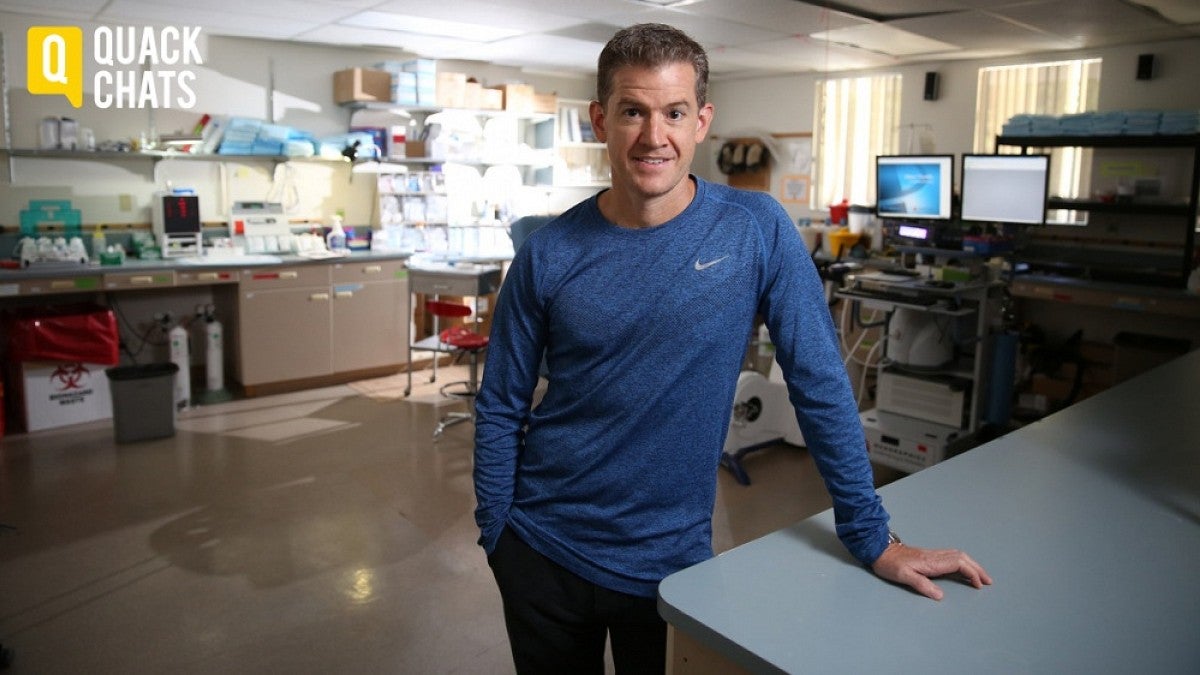The human heart is a marvel of biological engineering that keeps us healthy and alive, but it’s not without its imperfections.
One third of the population has a little-known, minor heart condition, a tiny hole known as a patent foramen ovale or PFO, says Andrew Lovering, a professor in the Department of Human Physiology, who has been studying the feature for the last 15 years.
“This seemingly insignificant heart condition can have significant impacts on human physiology,” Lovering said. “People with a PFO have different body temperatures, they breathe differently, they get sick at high altitude, and they may have higher levels of inflammation.”
But don’t go out and call your cardiologist just yet, Lovering said. For the billions of humans who have a PFO, it causes relatively few major problems for most of them. The condition and scientific research surrounding it is the focus of Lovering’s Dec. 12 Quack Chats pub talk, “The ‘Hole’ Story of Cardiovascular Physiology & Medicine,” at the Downtown Athletic Club.
The foramen ovale is a small flap-like opening present between the right and left upper chambers of the human heart that normally closes during early infancy. A foramen ovale that doesn't close is known as a patent foramen ovale, or PFO.
Lovering has been studying the condition for a decade and a half, and PFOs have been a known quantity since the second century when a Greek physician first wrote about it, but Lovering and other scientists still do not have a full understanding of the condition.
“Everybody wants to know why, but I’m not going to have any answers as to why,” Lovering said. “This talk is going to be more of a ‘wow’ than a why.”
The talk will explore Lovering’s own studies examining PFOs, including high-altitude acclimation research stemming from a 2012 expedition to a 17,257-foot-high Bolivian research facility. More recently, Lovering has been screening for PFOs in his UO lab and studying patients who are surgically reversing the condition.
For those who have PFOs and have issues related to it — multiple strokes, migraines or issues related to breathing — a procedure is available to close the hole. Lovering and his team are testing patients before and after the surgery, which is conducted locally at the Oregon Heart and Vascular Institute and McKenzie Heart Group.
During the procedure, doctors float a small device into the heart through a femoral vein and attach it at the location of the PFO. The heart then grows cells over the device, closing the hole.
Lovering reiterates that, in most people who have PFOs, the condition doesn’t necessarily cause any significant problems and many people will live their whole lives without ever knowing that a small developmental pathway within their heart never closed. But there are implications, both for those with the aforementioned health conditions and for others, many of which are still being discovered.
Lovering points to astronauts, soldiers and others for whom peak performance during exposure to extreme environments is a life-or-death matter as potential candidates for PFO screenings.
“The takeaway,” Lovering said, “is that the hole matters. We don’t know if having the hole is causing these physiological differences or if they are caused by the genetic program that also results in the hole not closing. But it matters.”
Lovering’s talk will begin at 6 p.m. at the Ax Billy Grill & Sports Bar, on the third floor of the Downtown Athletic Club, 999 Willamette St. Admission is free. Food and drinks will be available for purchase
Quack Chats is a program of University Communications. For more information, see the Quack Chats section on Around the O. A general description of Quack Chats and a calendar of additional Quack Chats and associated public events also can be found on the UO’s Quack Chats website.
—By Lewis Taylor, University Communications


